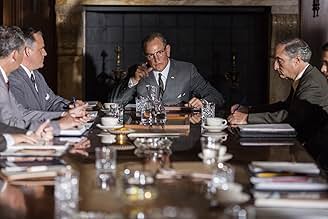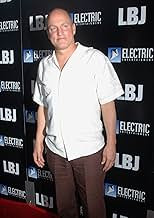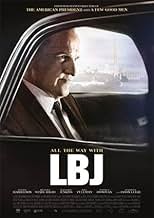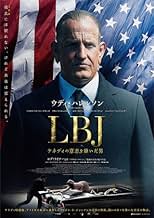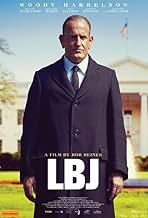Lyndon B. Johnson s'aligne sur John F. Kennedy, accède à la présidence et s'occupe de la lutte pour les droits civiques des années 60.Lyndon B. Johnson s'aligne sur John F. Kennedy, accède à la présidence et s'occupe de la lutte pour les droits civiques des années 60.Lyndon B. Johnson s'aligne sur John F. Kennedy, accède à la présidence et s'occupe de la lutte pour les droits civiques des années 60.
- Prix
- 1 nomination au total
- Cliff Carter
- (as Michael Horn)
Avis en vedette
Woody Harrelson and his facial prosthetics play LBJ, and Mr. Harrelson seems to be enjoying the swagger and emotional range of the titular man. What this film does that's a bit different from others is embrace the comedic elements – enhanced by both the performance and the script from Joey Hartstone. It seems odd (a somewhat awkward) to have so many laughs in a movie where the infamous 1963 Presidential motorcade, and subsequent assassination, form the backdrop.
Director Rob Reiner presents LBJ in all his crude and gruff glory, but also shows the ultimate politician – a man who was constantly negotiating. Intimidation was always part of the LBJ motif, and the film effectively displays the tactics used by John and Bobby Kennedy (Jeffrey Donovan, Michael Stahl-David) to take the wind out of LBJ's sails after the election.
There are reenactments throughout the film that place us back in the middle of iconic images seared into our memories the motorcade after the shots, the scene at Parkland, and the swearing in aboard Air Force One with Jackie still wearing her blood-stained Chanel suit. This was an incredible time in our history, as the nation was emotionally shattered. It's for this reason that much of the film seems disjointed or misguided. Too much (or maybe not enough) attention is on LBJ's strained relationship with Georgia Senator Richard Russell (Richard Jenkins), one of the most racist men we've seen on screen. Their discussion of race relations while being served dinner by the black woman is beyond uncomfortable – yet still somehow too stagey.
Most of the film is spent on LBJ's time as Senator and Vice President, with only the final act being about his famous networking upon ascending to the Presidency after which the entire focus is on the Civil Rights Act. The flow of the film seems a bit off, though most will enjoy watching Harrelson's performance – especially when paired with Jennifer Jason Leigh's Lady Bird. Together, the two almost rescue the script.
There is superb acting from Harrelson in a character study of the President from director Rob Reiner. There are some glaring physical drawbacks. First thing I noticed is that Harrelson is not quite the towering presence that the President was in real life. There is a real need to have that hulking sense on the screen. It's partly his physical presence that contributes to his power. In the same vein, Jeffrey Donovan doesn't have the pretty boy face of JFK especially if the movie keep harping on that fact. It wouldn't matter if those two Presidents aren't so defined by those characteristics. What gives the movie its power comes from LBJ calling, cajoling, and negotiating with the political world. It is more problematic to try to climax with his speech which is not his biggest strength. The climax should be the passing of the civil rights bill. Instead, it is covered in the closing text. Overall, Harrelson does an admirable job despite his physical dissimilarities. Outstanding support comes from Richard Jenkins. It's a solid biopic.
The film follows the years 1959-1963, a time when Johnson was at the height of his power. We follow his path from Senate majority leader, vice president, and ultimately, president. Along on the ride is his ever supporting wife, Lady Bird Johnson (Jennifer Jason Leigh). Lyndon also has to deal with the civil rights policies of JFK (Jeffrey Donovan) and how he is going to carry that legacy after the infamous assassination in Dallas.
The film only carries a 98-minute runtime and flows at a speedy pace. The only event we really spend that much time on is the civil rights debate. The Civil Rights Act of 1964 is the final act of the film and we never see anything else about Johnson's presidency. It doesn't feel right that a film titled LBJ only concentrates on less than half his term. The film also feels like it was made in the 90's because of the overly patriotic tone and score. I feel that releasing this film as a television movie would have been a better film because of the small size and focused storyline.
LBJ is also a slightly comedic film mostly because of the overly vulgar and blunt antics by Johnson himself. People that have lived through his administration will probably get most of the jokes and find the comedy in serious situations. The best moment comes in the beginning of the film when Johnson is heckling his workers and calling his tailor to resize his pants because of his "well endowment" and need for his "nuts to breathe".
The biggest disappointment of the film is the makeup. While it's usually not a huge component, in this instance it really throws off the look of the actors. Woody Harrelson in full makeup doesn't look that much like the real Johnson. A side by side comparison of the two will really puts the poor makeup in perspective. Jennifer Jason Leigh's transformation into Lady Bird Johnson ends up being even worse than Harrelson's. You can obviously see the makeup on her face and it doesn't look natural. It looks like she has a Halloween mask on her face.
The acting is either hit or miss, with some performances ranging from pretty good to downright bad. Woody Harrelson does a decent job as Johnson. He has the same gravitas and powerful demeanor Johnson had in real life. However, Harrelson doesn't have a convincing southern accent even though he spends about half his time talking about the south. His performance also pales in comparison to Bryan Cranston's role in the 2016 television film All the Way.
Jeffrey Donovan does a great job as John F. Kennedy. He perfectly imitates Kennedy's famous voice and shares many physical similarities with him. He plays Kennedy as a calm and collected politician that never cracked under pressure, especially when it came to civil rights. Michael Stahl-David does an equally great job as the Robert Kennedy. RFK is the opposite of his president brother since he is headstrong and not afraid to voice his unwanted opinion. He constantly butts heads with Johnson and they continue their rivalry throughout the whole film.
Jennifer Jason Leigh does a poor job trying to portray the famous first lady. She never delivers more than a couple of lines of dialogue at a time and doesn't have a convincing southern accent. Lastly, Bill Pullman delivers a weird and unneeded performance as Senator Ralph Yarborough. He only shows up for three scenes that total about less than ten minutes of screen time. He feels shoved in and I question why he's even in the film.
LBJ is a film that thought it was something special when it actually never lifts off the ground. Harrelson and Donovan are the only shining lights lackluster biopic that doesn't deliver on its promises. I recommend that viewers watch the superior All the Way if they want to learn about Johnson's involvement with the Civil Rights Movement.
Yet all of that changes as Johnson is thrown into the spotlight and becomes president after president Kennedy is hit and killed with an assassin's bullet in Dallas in 1963. Oh Lyndon has come along way from west Texas to the white house. Along the way doubt and indifference is found even from his own party, yet Johnson thru hard work determination and political back room workings gets the landmark Civil Rights Act passed in 1964.
Overall good film that's a historical and political look at a great figure a president that was for the people and their rights and a society changer even when it wasn't popular or it didn't seem the norm. "LBJ" is one picture to watch for historical and political social reasons.
The acting by Woody Harrelson and Jennifer Jason Leigh is excellent. You think you're watching the real thing. They are the only two actors who do such great job, and the others do OK.
There is a real sense that this is a docudrama rather than a film.
My main criticism is that the film makers stopped in mid film. The story of LBJ didn't end with the passage of the Civil Rights Act of 1964. It continued through the devastation of the Vietnam War. The true story is how Johnson squandered the legacy of JFK with his foreign policy, and all that is left out.
Le saviez-vous
- AnecdotesWoody Harrelson's late father Charles Harrelson was a Texas hitman who had famously claimed to have killed President Kennedy (he was sentenced to life in prison for murdering a Texas judge), but later admitted that he made up the story.
- GaffesHistorical quotes throughout the movie are edited to be more sensitive than the actual quotes were.
- Citations
Walter Jenkins: There's just no power in the vice presidency.
Lyndon B. Johnson: Walter, how long you been with me?
Walter Jenkins: 21 years.
Lyndon B. Johnson: And in 21 years, can you think of a time that I have taken over a new office, and not made it 100 times more powerful than when I got there?
Walter Jenkins: No, sir.
Lyndon B. Johnson: Power is where power goes.
- ConnexionsReferenced in Midnight Screenings: Tulip Fever (2017)
- Bandes originalesSons of Thane
Written by John Knowles
Courtesy of APM Music
Meilleurs choix
- How long is LBJ?Propulsé par Alexa
Détails
- Date de sortie
- Pays d’origine
- Site officiel
- Langue
- Aussi connu sous le nom de
- The President: Lyndon B. Johnson
- Lieux de tournage
- sociétés de production
- Consultez plus de crédits d'entreprise sur IMDbPro
Box-office
- Budget
- 26 000 000 $ US (estimation)
- Brut – États-Unis et Canada
- 2 470 979 $ US
- Fin de semaine d'ouverture – États-Unis et Canada
- 1 110 565 $ US
- 5 nov. 2017
- Brut – à l'échelle mondiale
- 2 510 151 $ US
Contribuer à cette page






